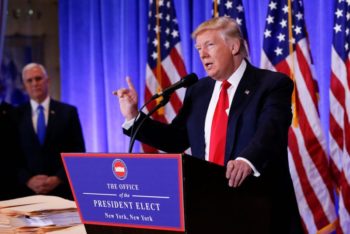
By Chester D. Hooper and Christopher R. Nolan
(Holland & Knight) – Much has been theorized in the past two months concerning whether the Trump Administration will follow through on President-Elect Donald Trump’s campaign pledge to “rip up” international trade deals such as the North American Free Trade Agreement (NAFTA) or withdraw from the World Trade Organization. But what of potential treaties that have not been entered into yet? What can we expect from the Trump Administration?
If the transportation infrastructure of the country is to be improved and modernized, the law governing transportation should be improved and modernized as well. Ratification of the “Rotterdam Rules” could provide a cornerstone for that effort. The aim of the Rotterdam Rules, signed in 2009, is to unify the law governing international door-to-door carriage of cargo. Its charge is to help modernize international carriage by facilitating electronic commerce in the same manner as domestic U.S. law now facilitates domestic electronic commerce.
Today, U.S. parties often file loss or damage suits against carriers in foreign countries rather than in the United States. Bills of lading issued by carriers often contain clauses that require suits to be filed in foreign countries – and those clauses have been upheld by U.S. courts. The Rotterdam Rules change this equation by permitting U.S. cargo interests to file suit in the U.S. against carriers for loss or damage to cargo carried to or from the U.S. even if the carrier’s bill of lading calls for suit in a foreign country.
The Trump Administration’s oft-stated goal is to be the most business-friendly administration in decades. Should this be the case, the Rotterdam Rules may well have the support of Trump after he is inaugurated on Jan. 20, 2017. In principle, international and domestic chambers of commerce have supported ratification of the Rotterdam Rules, and carrier and cargo interests involved in the international carriage of goods have already acknowledged the rules’ value in the maritime industry. An interesting example of this acknowledgement is ExxonMobil, which incorporated the Rotterdam Rules into its ExxonMobilvoy 2012 form of charter party. See Clause Paramount, paragraph 27(i) beginning at line 448 of the form, a copy of which is posted on the Gard AS website. The incorporation of the Rotterdam Rules as the “default” contractual arrangement for cargo disputes between the owner and the charterer under ExxonMobilvoy 2012 is a business decision for shipping interests.
A renewed interest in UNCLOS?
Separately, the United Nations’ Convention on the Law of the Sea (UNCLOS) remains unratified by the Senate. There was industry optimism that President Barack Obama and Vice President Joe Biden would push for its formal recognition, having made positive statements concerning UNCLOS when serving on the Senate Foreign Relations Committee. However, eight years have come and gone without significant progress toward ratification.
UNCLOS has maritime commerce implications concerning deep-sea mining, telecommunications, oil interests and the Arctic, all of which mean potential jobs and revenues for U.S. businesses. Over the years, interests such as the U.S. Chamber of Commerce and the American Petroleum Institute supported it. A pro-business administration such as Trump’s is likely to take a keen interest in UNCLOS.
Nolan is a litigation attorney in Holland & Knight’s New York office and a member of the firm’s Litigation and Dispute Resolution practice.
Copyright Ships & Ports Ltd. Permission to use quotations from this article is granted subject to appropriate credit given to www.shipsandports.com.ng as the source.
